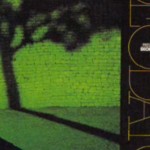Sub-title: In Praise of the Fender Rhodes
In 1972, Eumir Deodato’s funked and fused arrangement of Richard Strauss’s “Also Sprach Zarathustra” reached number 2 on the American charts and earned him a Grammy for Best Pop Instrumental Performance. (It also, I assume, earned him a commitment to playing the song as an encore every. single. night. of. his. life.)
I only know of Deodato because of Being There (1979). Hal Ashby drops his needle on “Zarathustra” during the long sequence near the beginning of the film when Chance leaves his now-dead employer’s estate and wanders, umbrella and suitcase in hand, through the streets of Washington, D.C. Ashby has impeccable taste in music — most famously the Cat Stevens songs throughout Harold and Maude and Tim Buckley’s “Once I Was” at the end of Coming Home — but the Deodato cue might be my favorite. It’s a perfect pairing with Jerzy Kosinski’s story, all allegory and irony and self-reflexive allusion. Plus — I’ll admit it — I really like the song.
Girish and I have already decided that, if we need a break from movies next month, we’re going to explore the music shops around downtown Toronto. (Suggestions?) I’m unofficially in the market for a vintage Fender Rhodes. I’m flexible regarding the model, though an early 73-key Mark I would be my first choice. All that matters to me, really, is that it has the sound and feel of the electric pianos played on so many great recordings of the early-1970s.
I’ve been tempted to buy a new keyboard — something with weighted keys and a large stash of pre-loaded sounds. It would be more flexible, certainly, and could lay the groundwork for some home recording. I’ve gone so far as to spend hours and hours at the local Guitar Center, auditioning, researching, asking questions. But when I’m there, I almost always sit down, click through to the Fender Rhodes sounds, and annoy the hell out of Joanna by playing Steely Dan songs. (“The Dan” is a running joke in our house. We once heard “FM” during four consecutive trips to the grocery store. The look on Joanna’s face when she mocks Donald Fagen’s lisp — “No thtatic at all” — is one of the many reasons I love her.)
So I think I might just get an old Rhodes, which, really, is the greatest instrument ever, after all. Without the Rhodes there’d be no epic intro to Pink Floyd’s “Sheep,” the opening chords of “Deacon Blue” would be utterly forgettable (rather than transcendent — which they ARE), Jeff Beck’s “Cause We’ve Ended as Lovers” would be just one more guitar player showing off his volume pedal, and Peter Frampton would never have uttered the words, “Bob Mayo on keyboards! Bob Mayo!” And I haven’t even mentioned Chick Corea, Herbie Hancock, Billy Payne, Stevie Wonder, Joe Zawinul, or, like, every keyboard player who recorded with Jerry Wexler at Atlantic in the late-’60s and early-70s. (I’ve been playing the hell out of Aretha Franklin’s Lady Soul this week.)
So there you go. Granted, Deodato’s “Zarathustra” has the faint smell of cheese, but try to enjoy it with as little irony as possible.
